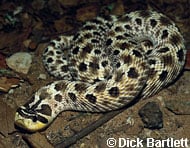Mexican Hognose
The species is found from southwestern and extreme southern Texas into northeastern and central Mexico.
This species often has been considered a southern subspecies of the western hognose, Heterodon nasicus, but recently has been elevated to species rank.
The Mexican hognose is a sedentary species that needs little room, so a 10-gallon aquarium or similar sized plastic tub is suitable as a terrarium. For substrate, use any loose material that allows the snake to comfortably burrow and remain dry. A few inches of aspen works well, as does heavier and harder to clean sand. The snake will usually burrow under a branch or other decoration and will come out at night. Temperatures should be within a few degrees of 85 degrees Fahrenheit, dropping only a small amount at night. A basking light seldom will be used and is unnecessary. Provide water in a shallow bowl and never allow the substrate to become moist. Most specimens will not drink, getting their water from their food.
Mexican hognoses feed mostly on lizards and small rodents; they are not toad-feeders. Wild-caught specimens should be wormed by a veterinarian, but captive-bred specimens generally have few parasites. Try feeding your specimen pinky or hopper mice at night. If mice are not taken after a few attempts, try lizards, preferably alive. Once the snake is feeding, you can switch it to mice from lizards by rubbing a dead lizard over a pinky mouse to trick the snake into feeding. Most specimens eventually will switch to mice.
Although not technically venomous, some people have shown allergic reactions to bites from this rear-fanged snake.

